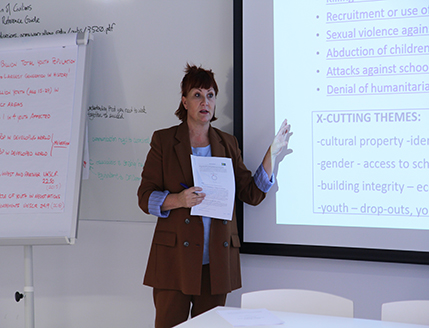Clare Hutchinson emphasizes the importance of integrating gender equality into crisis management
The Finnish Defence Forces International Centre’s 50th Anniversary Seminar on 23 October will be attended by four top international crisis management experts. The NATO Secretary General’s Special Representative Clare Hutchinson’s field of expertise consists in the promotion of the dimension of women, peace and security, including the coordination, consistency and implementation of the measures involving this entity in NATO.
For over a decade, Hutchinson worked as a Gender Adviser with the United Nations, and her work has contributed to the inclusion of priorities involving women, peace and security in peacekeeping activities. She is from Great Britain, but she has Canadian nationality as well.
We asked Ms. Hutchinson to speak about crisis management from the perspective of her expertise, and in the Seminar, we will have an opportunity to listen to her views and experiences. The audience and the speakers are looking forward to discussions on today’s crisis management issues.

What are your expectations for the FINCENT 50th Anniversary Seminar?
Explore the changing security and peace environment, to address some of the emerging challenges and understand how to respond to these challenges effectively.
Highlight concrete examples in training and development of a new set of training tools to address emerging security challenges as advocated by FINCENT – Protection of Civilians (PoC), Children And Armed Conflict (CAAC) and Cultural Property Protection (CPP) and to think about other emerging security threats – a changing security environment warrants new ways of looking at things and new ways of doing things – a new approach which is characterized by ‘joined-up thinking’ and to raise creativity to develop concrete measures in Human Security.
What is the main message of your speech? What ideas or thoughts do you hope to awaken in the minds of the audience?
My main Message is to highlight the fundamental importance of adopting a broad-based Human Security approach going forward. It is essential to make clear that we have to improve the Human Security topics such as Women, Peace and Security (WPS), PoC, CAAC, Human Trafficking (HT), Sexual Gender Based Violence (SGBV), Youth, Peace and Security (YPS) in order to raise awareness that these topics are inevitable for all NATO operations and missions.
The importance of human security to emerging challenges, how a gender analysis must underpin all the work on protection, and how cross cutting themes can supplement traditional military responses. A people centric approach is one that must be considered as necessary to peace and security.
What is lost when there is a failure to understand the human aspect of peace and security and how PoC must be revised in the face of emerging challenges – migrant challenge, climate change, hybrid, cyber, urbanization, social unrest, and poverty growing inequality?
Civil society also has to play a strong and complementary, and symbiotic role – both strategically and operationally, including women’s voices as a conduit to protection at all stages.
What do you consider the most interesting aspect in your field of crisis management?
The contribution of women and girls to conflict prevention, disaster risk reduction and conflict recovery is often undervalued, under-utilized and under-resourced. How can we bring a more robust gender analysis to crisis management to allow for better protection and prevention? This is a question that keeps me, and many of my other colleagues in NATO leadership awake. The answer is, as with many such international strategic dilemmas, both multi-faceted and complex. The following points must be considered. The most interesting aspect is whilst the contribution of women is increasingly determined to be essential, it is often the most frequently marginalized group in crisis management situation.
How and what equality related aspects should be taken into account in crisis management education? How could women’s participation be increased? How could the cooperation between civilians and military be improved through education?
More attention should be placed on bringing together civil-military understanding vis-à-vis crisis management – training and capacity building that enhances the knowledge of the various roles and complementarity of each. Gender integration is missing in PoC across all organizations. Comprehensive understanding and respect for each other’s perspective – join up our thinking and approach! A voice is not necessarily empowerment!
What is NATO’s message about equality and the status of women in crisis management education?
NATO’s message is clear and unequivocal and has to take into account early intervention, coordinated approach, agreed messaging, mutual acceptance, gender mainstreaming across all activities at all levels as well as gender balance at all levels.
Follow the Finnish Defence Forces International Centre 50th Anniversary events
Follow the media releases at https://puolustusvoimat.fi/en/web/fincent/fincent-50-years. The Anniversary Seminar will be accessible real-time at https://puolustusvoimat.fi/en/web/fincent/live-streaming.



